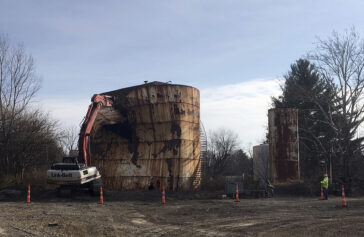Best of the Week — First Winner
AP team demonstrates what a community loses when a small-town newspaper dies
What’s lost when a newspaper dies? And how do you tell the story of this slow disaster happening in front of everyone’s eyes and still make the world sit up and take notice?
For reporters Dave Bauder and David Lieb, the answer was by focusing on the residents of one small town as they explained the death of local journalism in an authentic, vivid and compelling way.
It’s a story that’s happened repeatedly across the country, with 1,400 cities or towns losing newspapers in the last 15 years. The aftermath of the loss of the Daily Guide in Waynesville, Missouri, was richly told by a multiformat team of text, video and photo journalists as the centerpiece story for “Fading Light,” the AP’s Sunshine Week package on the decline of local news.
New York-based media reporter Bauder and Lieb, a member of the state government team based in Missouri’s capitol, spent several days in Waynesville and its twin city, St. Robert, reporting the story. Denver video journalist Peter Banda and Kansas City photographer Orlin Wagner worked closely with them to shoot visuals, while Alina Hartounian, the multiformat coordinator for the U.S. beat teams, created social videos that drove readers to the story. Bauder also secured an interview with executives at the company that shuttered the Daily Guide.
The package received incredible attention and sparked discussion online. Bauder and Lieb’s text story has been viewed nearly 120,000 times with high engagement, it has landed on nearly 30 front pages, and has been cited in several influential media reports.
For masterful work shining a light on a problem that has left whole communities less informed, Bauder, Lieb, Banda, Wagner and Hartounian win AP’s Best of the Week award.















